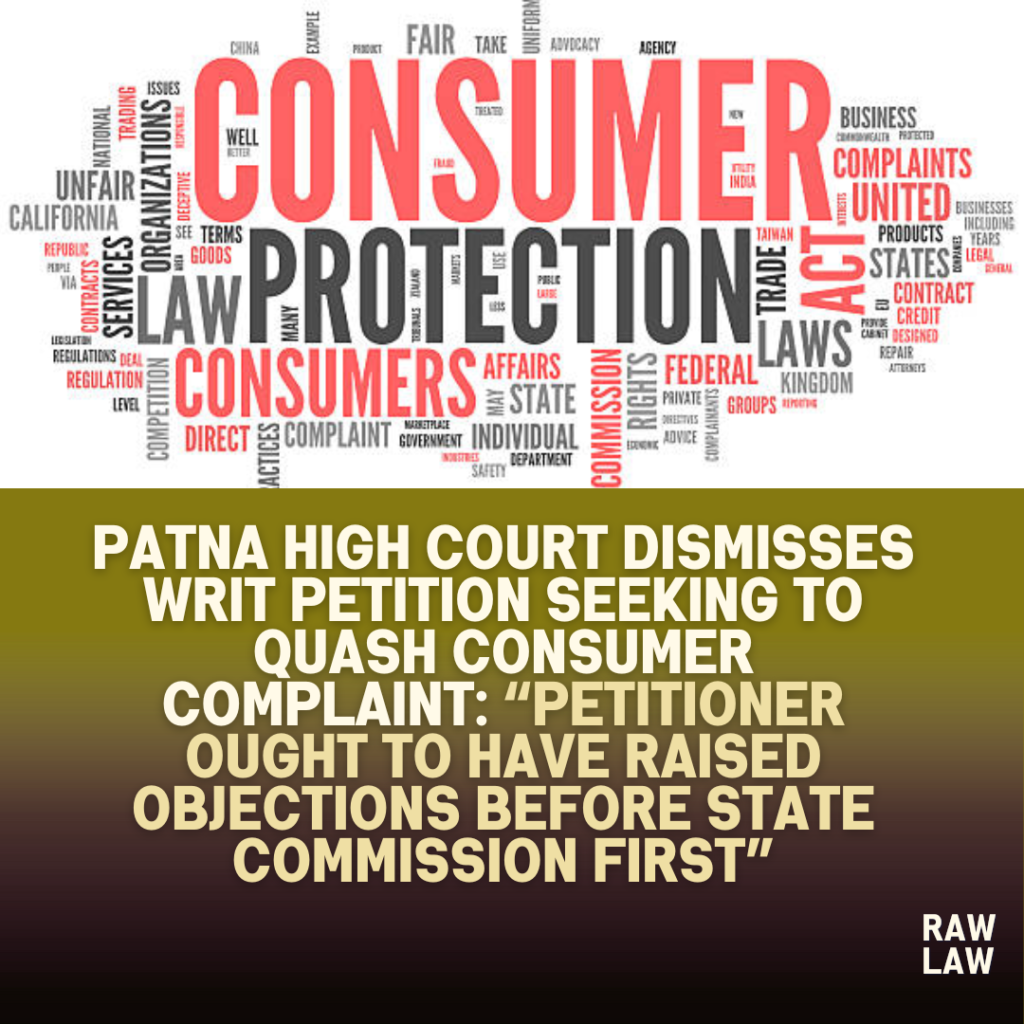Court’s Decision
The Patna High Court dismissed a writ petition filed by a corporate petitioner seeking quashing of Complaint Case No. 25 of 2015 pending before the State Consumer Disputes Redressal Commission, Bihar. The petitioner had not raised any preliminary objection before the Commission regarding maintainability of the complaint under Section 17 of the Consumer Protection Act, 1986.
The Court held:
“If the petitioner had any grievances, he ought to have filed objections or a petition before the State Commission… Without raising any preliminary objection… the petitioner has filed this writ petition… which is not maintainable.”
Accordingly, the writ petition was dismissed as being devoid of merit.
Facts
The petitioner, a company, was arrayed as a party in Complaint Case No. 25 of 2015 pending before the State Consumer Disputes Redressal Commission, Bihar. The complaint was filed by a consumer alleging deficiencies in service related to certain equipment involving multiple parties.
Instead of raising any preliminary objection before the State Commission regarding jurisdiction or maintainability under Section 17 of the Consumer Protection Act, the petitioner approached the High Court in 2017 seeking to quash the entire proceedings.
The reliefs sought included:
- Quashing of the complaint proceedings.
- A writ of prohibition or similar direction restraining the Commission from adjudicating the matter.
- A declaration that the complaint was not maintainable under Section 17 of the Consumer Protection Act, 1986.
Issues
- Whether a writ petition is maintainable without first exhausting alternative statutory remedies under the Consumer Protection Act?
- Whether the petitioner could bypass the State Commission and directly approach the High Court for quashing of proceedings?
- Whether the complaint was maintainable before the State Commission in terms of Section 17 of the Consumer Protection Act, 1986?
Petitioner’s Arguments
The petitioner claimed that the proceedings in Complaint Case No. 25 of 2015 were not maintainable before the State Commission as per Section 17 of the Consumer Protection Act. It argued that it was wrongly impleaded and sought quashing of the complaint proceedings on the ground of lack of jurisdiction. The petitioner submitted that continuation of proceedings would be a misuse of process and result in undue hardship.
Respondent’s Arguments
While the State did not file a detailed counter, the Court considered the procedural lapse on part of the petitioner—namely, that no objection or application challenging the maintainability of the complaint had been filed before the State Commission itself. The Court was not persuaded to interfere through writ jurisdiction in light of this omission.
Analysis of the Law
The High Court reiterated the principle of exhaustion of alternative remedies. It emphasized that where a forum is vested with jurisdiction to decide preliminary issues, including maintainability, parties are required to raise such objections before the said forum first. The writ jurisdiction under Article 226 is discretionary and should not be invoked in the absence of exceptional circumstances or failure of justice.
Precedent Analysis
While no precedents were cited within the order, the ruling is consistent with settled jurisprudence that discourages bypassing statutory tribunals. The Supreme Court in Union of India v. T.R. Varma and State of U.P. v. Mohd. Nooh has repeatedly cautioned against invoking writ jurisdiction without exhausting available remedies unless gross injustice or abuse of process is evident.
Court’s Reasoning
The Court observed that the petitioner could have raised a preliminary objection before the State Commission, which is empowered to adjudicate on such matters. Instead, it chose to approach the High Court straightaway. The Court noted:
“Without raising any preliminary objection before the State Commission, the petitioner has filed this writ petition before this Court… which is not maintainable.”
Thus, it held that the petition was filed prematurely and did not warrant interference under Article 226.
Conclusion
The writ petition was dismissed as not maintainable. The Court made it clear that the petitioner must first raise its objections before the appropriate forum—in this case, the State Consumer Disputes Redressal Commission. No costs were awarded.
Implications
- The ruling reinforces the principle that High Courts should not entertain writ petitions when alternate remedies exist.
- It underscores the need to raise objections regarding jurisdiction or maintainability at the earliest opportunity before the statutory forum.
- The judgment serves as a cautionary precedent for corporations and litigants attempting to circumvent consumer forums by directly invoking writ jurisdiction.
FAQs
Q1. Can I approach the High Court to quash a consumer complaint without going to the Consumer Commission first?
No. The High Court will typically not entertain such a writ petition if you haven’t first raised your objections before the Consumer Commission.
Q2. What is Section 17 of the Consumer Protection Act, 1986?
Section 17 defines the jurisdiction of State Commissions to entertain consumer complaints involving compensation exceeding a certain monetary limit and particular subject-matter.
Q3. What should be done if a complaint is wrongly filed before the Consumer Commission?
File a preliminary objection or application before the Commission challenging the maintainability or jurisdiction of the complaint.



